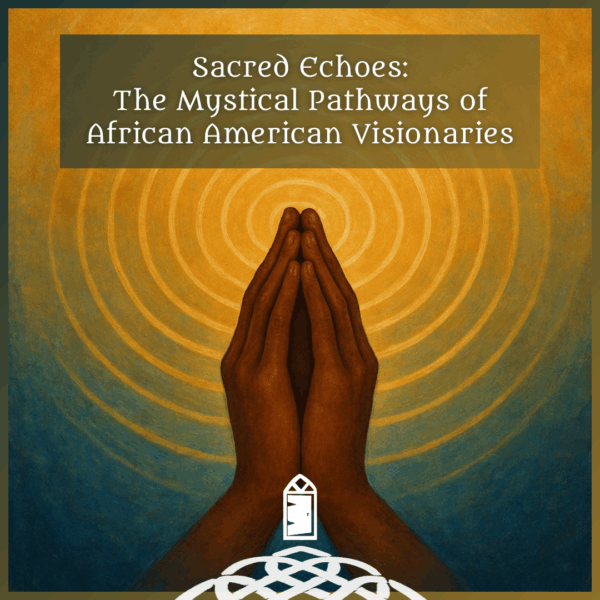We continue our Monk in the World series of guest posts with a reflection from Carl McColman. Carl has written some beautiful books about mysticism, introducing lay people to the term and inviting them to embrace its gifts for their own lives. I am pleased to welcome his (somewhat contrary) voice into this space:
Living in the World (Whether or Not You’re a Monk)
Ten years ago Wayne Teasdale wrote a book called A Monk in the World. It’s based on an idea he received from Bede Griffiths, the Benedictine monk who founded a Christian ashram in India. The idea is simple: the time has come for the spirituality of the monk to travel beyond the confines of the traditional cloister. Others have picked up this theme as well. Bruce Davis wrote a book called Monastery Without Walls: Daily Life in the Silence. Joan Chittister’s poetic look at an uncloistered spirituality is called Monastery of the Heart, reminiscent of the lovely title of a book by the Association of Contemplative Sisters, Cloister of the Heart. It’s a simple, powerful and lovely message: living in a monastery, a “set apart” community of vowed religious celibates, is no longer a requirement for cultivating a meaningful contemplative life. As Thomas Merton so powerfully discovered during his “epiphany” in 1958, the call of spiritual transformation goes out to all human beings, not just those with a vocation to the cloister.
So how do I live this “un-cloistered” life? First of all, forgive me for a being a bit contrary, but I don’t like to think of myself as a monk in the world. After working for a Trappist monastery for almost eight years, and forming a spiritual bond with the monks as a Lay Cistercian, I love the monks and admire them for their life — but just as Merton’s epiphany made him feel re-affirmed in being a monk, I feel just as affirmed in not being one. Calling me a monk makes about as much sense as calling the typical cloistered monk a husband. It’s just an inaccurate use of language. It’s okay if other people want to call themselves monks; that’s fine. It’s just not a word that works for me.
I think why I bristle against it is because of the resistance I’ve run into when I tell people I study and write about mysticism. “I could never be a mystic,” I often hear, and usually from people who are dedicated Christians, regular churchgoers and who sincerely try to live good and prayerful lives. They are committed to fostering a relationship with God, but can’t imagine themselves as mystics. Why is that? I think it goes back to an unspoken assumption that mystics, like saints, are somehow special, members of God’s elite squad. I think many people have similar ways of thinking about nuns and monks. They are the special ones, who are closer to God, and who are supposed to be holy, or contemplative, or mystical. But that’s not for the rest of us — we’re too busy paying the mortgage and getting the kids to school on time.
I think we need to be wary of language that creates distance, or separation, or subtly suggests that people inhabit different “categories” or “types” of faith or spirituality. It is said that Dorothy Day once scoffed, “Don’t call me a saint. I don’t want to be dismissed so easily.” She knew that once a person was canonized, the average Christian saw them as representing some sort of unattainable ideal (which meant, of course, that there was no point in even trying to be like the saint).
So I say, don’t call me a monk — not even a “monk in the world” — because I don’t want the spiritual practices, that mean so much to me, to be dismissed so easily. I don’t want to in any way suggest that regular daily prayer, including lectio divina, meditation, and the prayer of intentional silence, are only for monks (or monk wanna-bes). Contemplative practices are for everyone, not just monks or nuns. And engaging in contemplative practice doesn’t make you a “monk in the world” (at least, not in my book). It simply confirms that you are intentional and serious about your faith. It simply helps you to be a mature Christian.
If we think that lay contemplatives are “monks in the world,” then what does that make cloistered monks: are monks “out of this world”? I’m being silly, I know, but it is an important point.
Granted, the Bible has language about being “in, but not of, the world” and following that, there is this idea that somehow the monastic cloister is separate from the mundane reality the rest of us inhabit. I admire how monks, even in our hyper-connected world, try to shield themselves from the less edifying qualities of our consumer society. But any of us can, at least to some extent, shield ourselves from the unhelpful aspects of our culture. We don’t have to live in a cloister to do it. And especially nowadays with the prevalence of electronic communication, being in a cloister is no guarantee that you will be removed from our dysfunctional culture.
So how do I try to foster a contemplative life in the midst of my busy life “in the world”? It’s not so much about what I do but what I don’t do. I seek to live simply, modestly, and to be vigilant about maintaining enough time for weekly Sabbath rest and daily silence. Likewise, I believe contemplation is not about what we do (as if engaging in more and more spiritual activities can “achieve” contemplation) so much as about our view. “The fullness of joy is to behold God in all,” declared Julian of Norwich. Richard Rohr called it “learning to see as the mystics see.” What is the heart of this beholding? To see with the eyes of love. So everything contemplatives do, from a daily practice of silence and prayer, to living simply, to honoring Sabbath time — it all goes back to fostering that loving view. That, to me, is the heart of the contemplative life: no matter what label we wear.
Carl McColman is the author of Answering the Contemplative Call: First Steps on the Mystical Path and The Big Book of Christian Mysticism: The Essential Guide to Contemplative Spirituality. He is a Lay Cistercian of Our Lady of the Holy Spirit, in association with the Monastery of the Holy Spirit in Conyers, GA. Connect with Carl at his blog, www.carlmccolman.com, or on Twitter at @carlmccolman




15 Responses
We could probably say that the author is a contemplative, not a monk, at least according to his own view.
The term “monk” has acquired a specific meaning over the centuries, so that a lay person who does not express in his or her own life the defining attributes of a “monk” is not one according to this specific meaning. One of these defining attributes is physical separation from the world, which is not practicable for the lay person, except in the context of membership in a religious community. The expression “monk in the world” is in fact intended to be oxymoronic or at least ironic. By the fact of physical separation, the monk, traditionally understood, is not “in the world.”
It remains to be seen whether the expression “monk in the world” refers to a “monk” in any traditional or meaningful sense of the word. Clearly, the author believes that a person who seeks to adapt monastic practices to the secular and lay condition is adequately described by the term “contemplative.” Using the term “monk” would be inaccurate, in his view.
While I agree in substance with the author, I would, however, say that the lay contemplative who successfully adapts monastic practices to the secular and lay state is a monk in a specific metaphorical sense, accurately so, but not according to the traditional denotation of the word.
What matters ultimately is not the theory but the practice. Also, theory serves a useful purpose: it is a coherent framework to guide and support practice.
I cannot find, anywhere, that it is suggested a monk “is physical separation from the world” ( other than what you have written above ). Can you elucidate on this.
For starters, look at Merton’s recounting of his epiphany at the corner of Fourth and Walnut Streets in Louisville in 1958. It’s in “The Night Spirit and the Dawn Air” section of “Conjectures of a Guilty Bystander” (pages 140-142 of the hardcover edition). Merton writes: “…the conception of ‘separation from the world’ that we have in the monastery too easily presents itself as a complete illusion…” Of course Merton wrote this prior to Vatican II, but even today a monastic enclosure establishes a meaningful boundary of separation between the cloister and the “world.” I tried to find an explicit reference to this in the Rule, and Chapter 67 seems to come pretty close: “No one should presume to tell anyone else what he saw or heard outside the monastery, for this can cause great harm. If someone does venture to do so, he should submit to the punishment of the rule. The same goes for anyone who dares to leave the enclosure of the monastery to go anywhere or to do anything however trivial without being instructed to do so by the abbot.” Monastic life is counter-cultural in the best sense of the word, but its countercultural identity rests on the meaning of the cloister/enclosure, by which the monk withdraws from the mainstream of secular society.
Thanks for your aricle Carl. Personally I believe a being a contemplative is for anybody whether they are in a cloister or not. It is a gift given by the Holy Spirit. St. Benedict’s monasticism was not specifically contemplative or active – it was an environment for those who were wanting to seek God regardless of their state in life. Within the monastery there may be /are those called to a more contemplative life style and those who are not so called. St. Benedict’s emphasis on hospitality calls for both prayer and action and much flexibility in his rule is given as regards that in other spheres of life within the monastery. For Benedict there is no specific “contemplative” or “active” life.
Both need each other. As an early desert father said: “Mary needs Martha as much as Martha needs Mary.”
An addendum: When I said that “The Monastic Vocation is just that” it should have been the start of a new paragraph. What I wanted to say is that the monastic vocation is a calling and life within a monastic setup and cannot be fully lived outside of it in its entirety for long periods of time – different parts of the way of life can be practised but that the monastic vocation is lived fully within the cloister. We can enrich and develop our prayer lives with applying some of the practices as we live out our baptismal calling and faith lives.
I found this a beautiful and sensible article. As a Missionary I see my role as a “contemplative in action.” The monastic vocation is just that. Some of the monastic way of life can be undertaken by those married and others who are active religious, missionary or members of Secular Institutes or Societies and Third Orders of Ways and we have to recognise this and allow this encounter with Christ in these practices to enrich our lives. The reflective practices are to enrich, strengthen, encourage, comfort, stablise, calm etc our lives and be a way to enter more deeply into the Christ encounter so we can draw deeper and more profound meaning from what we do and become more mature in Christian engagement. For some the expression “Contemplatives in action” may be to Jesuit-like but it is part of the richness of the church and keeps us focused on God and I can understand why Carl wants the distinct calls to be acknowledged and says (Not quite a) Monk in the world.
Your care with words reminds me of a struggle I had 20 years ago. I am a United Methodist pastor, obviously an active vocation as traditionally conceived. Yet I have long felt a yearning or desire – indeed, a call – to a more contemplative way of life.
How to convey that call to church leadership within a denominational structure to whom it was largely foreign? At first I picked up on the identity of a “contemplative pastor,” about which Eugene Peterson was writing. It still didn’t feel quite right, so switched the terms – a “pastoral contemplative.” So the emphasis was on- What kind of contemplative am
I? rather than, What kind of pastor am I?
Words, words – not the most important consideration, but that exercise helped to clarify my identity as God’s servant.
John,
I too am a United Methodist pastor, struggling with the same issues. I like your approach as a “pastoral contemplative.” Thank you for this phrase. I will try it on and see how it “fits.” Blessings in your ministry.
Carl, There are terrific people who have the gift of writing..speaking what others are trying to put into words. You have done that for me in this article. I tried to make a copy of this but could not find the word PRINT..
Please give directions for that. Blessings, Nancy
[“…contemplation is not about what we do (as if engaging in more and more spiritual activities can “achieve” contemplation) so much as about our view.”]
Language is so ambiguous and people are so diverse (in both temperament and education), that what (I take) the author to be saying can be easily missed. For a non-religious, non-sectarian account of this different “vision” or “seeing”, I encourage anyone who is so inclined to check out “The Headless Way” (headless.org) and be sure to see the video-biography of Douglass Harding:
https://www.youtube.com/watch?v=1q3VacEvh8M
p.s. C.S. Lewis wrote a preface for Douglass Harding’s magnum opus, “The Hierarchy of Heaven and Earth”
Interesting posts. Thank you.
Words not only inform, but also form. We are all formed in our unique ways. Therefore language is always tricky and something we have to hold in tension, due to our differing interpretations coming from our different experiences. But what choice do we have? To converse or not? I think listening is the key – what is behind that word; what is she really saying?
We all have words that are triggers of some past harm. But that same word might trigger a joy in another person. Those are personal and unique; they are something we all have to be dealt with individually, sometimes with a great deal of work. I think our job is to not stay stuck in our own interpretation, but try to hear what the other person is communicating.
At the same time, the speaker needs to be aware of the challenges of communicating, not to be silent, but to share with awareness and sensitivity, and remembering that sharing is a two way street. To share with the speaker/writer where the tension lies is important for the communication to deepen.
This is challenge is exactly why it is said almost all our problems come down to failures to communicate. We all live in this tension. It is part of the dance of life. We apologize when we step on the other’s toes, and the dance goes on.
So thank you Carl and Karen for sharing your experiences. And when we get to the bottom of the semantics, we discover we are on the same page, or at least in the same book!
Thanks for, as Christine put it, the “somewhat contrary” posting! I too am uncomfortable calling myself a “monk in the world” but I thoroughly appreciate what I believe Christine is trying to do, and the “community” (very real!) that she is trying to form and foster. Maybe we should all just be calling ourselves “mystics” or “mystics-in-training”? (smile)
You remind of us some very important elements of contemplative life that I think don’t get talked about enough among some of us lay persons aspiring to contemplative life–the importance of a simple life of modest means, and service. I thank you for that! I’ll be looking at your web site…blessings!